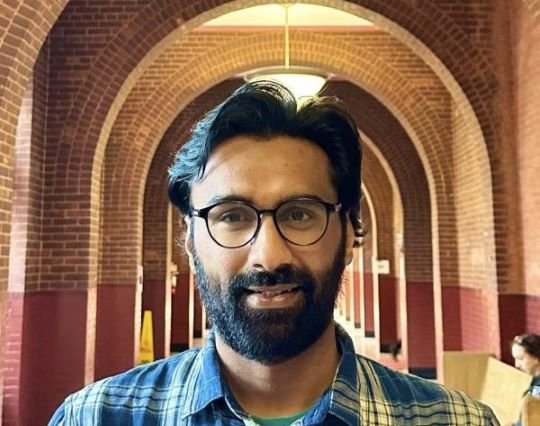Indian Researcher in US Faces Deportation Over ‘Hamas Propaganda’
The recent arrest of Indian researcher Dr. Badar Khan Suri in the United States has ignited a storm of controversy, raising questions about academic freedom, visa security, and the fine line between free speech and national security concerns. Dr. Suri, a postdoctoral fellow at Georgetown University, was detained by U.S. immigration officials outside his residence in Virginia and now faces deportation.
Suri was a foreign exchange student at Georgetown University actively spreading Hamas propaganda and promoting antisemitism on social media.
Suri has close connections to a known or suspected terrorist, who is a senior advisor to Hamas. The Secretary of State issued a… https://t.co/gU02gLAlX1
— Tricia McLaughlin (@TriciaOhio) March 20, 2025
His arrest, carried out by masked agents, was reportedly based on allegations that he was involved in spreading “Hamas propaganda” and maintaining ties with a suspected senior advisor to Hamas. The Department of Homeland Security (DHS) claims his presence in the U.S. poses a national security risk under the Immigration and Nationality Act.
Allegations and Legal Defense
Tricia McLaughlin, Assistant Secretary at DHS, took to social media to confirm that Suri was “actively spreading Hamas propaganda” and had “close connections” to an individual identified as a senior advisor to Hamas. The U.S. Secretary of State officially determined his activities made him deportable under INA section 237(a)(4)(C)(i).
However, Suri’s legal team has strongly refuted these claims. His attorney, Hassan Ahmad, argues that his detention is politically motivated, influenced by the Palestinian heritage of his wife, Mapheze Saleh, a U.S. citizen and first-year student at Georgetown University’s Center for Contemporary Arab Studies. Saleh, originally from Gaza, completed her education in journalism and peacebuilding at institutions in Palestine and India.
Georgetown University also issued a statement defending Suri, clarifying that he was lawfully present in the country for academic research and had not engaged in illegal activities. “We support our community members’ rights to free and open inquiry, deliberation, and debate, even if the underlying ideas may be difficult, controversial, or objectionable. We expect the legal system to adjudicate this case fairly,” a university spokesperson said.
Who is Dr. Badar Khan Suri?
Dr. Suri is a postdoctoral fellow at the Alwaleed Bin Talal Center for Muslim-Christian Understanding at Georgetown University’s School of Foreign Service. He specializes in religion, violence, ethnic conflicts, and peacebuilding in South Asia and the Middle East.
His academic background includes a PhD in Peace and Conflict Studies from Jamia Millia Islamia, New Delhi, with a focus on majoritarianism and minority rights. This semester, he was teaching a course on these topics, making his arrest particularly alarming for those advocating academic freedom.
The Growing Trend of Visa Revocations Among Foreign Scholars
Suri’s case is not an isolated incident. Just last week, Ranjani Srinivasan, a 37-year-old Indian doctoral student at Columbia University, self-deported after the U.S. revoked her visa. Srinivasan was accused of supporting Hamas due to her participation in pro-Palestine protests. The Department of State canceled her visa, citing security concerns, and DHS tracked her self-deportation through the Customs and Border Protection (CBP) app.
Homeland Security Secretary Kristi Noem went further, branding Srinivasan a “terrorist sympathizer” and stating that anyone who “advocates terrorism and violence” has no place in the U.S. This approach signals a harsh crackdown on foreign nationals engaging in political discourse deemed controversial by the U.S. government.
Academic Freedom or National Security?
The case of Dr. Suri highlights the increasing scrutiny placed on international scholars in the U.S. At a time when global academic collaboration is crucial, incidents like these raise concerns about the weaponization of visa policies. While national security is a legitimate concern, critics argue that labeling researchers as security threats without transparent investigations sets a dangerous precedent.
Georgetown University and legal experts have emphasized the importance of ensuring due process in such cases. The question remains: Is this a case of a legitimate security threat, or is it an example of an immigration system being used to suppress dissenting voices in academic circles?
As the legal proceedings unfold, Dr. Suri’s case will likely serve as a litmus test for the balance between academic freedom and national security in the United States.
Also see:
Trump Announces “Reciprocal Tariff” Plan, Targets India and Other Nations
Tesla Signs Mumbai Showroom Lease, Marks Entry into Indian Market
EU Unveils €800 Billion Plan to Strengthen Defence
—————————————————————
It would mean the world to us if you follow us on Twitter, Instagram and Facebook




